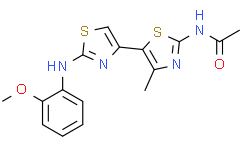| Cas No.: | 315705-75-0 |
| Chemical Name: | N-[5-[2-(2-Methoxyanilino)-1,3-thiazol-4-yl]-4-methyl-1,3-thiazol-2-yl]acetamide |
| Synonyms: | JNJ0966;N-(2-((2-methoxyphenyl)amino)-4'-methyl-[4,5'-bithiazol]-2'-yl)acetamide;Oprea1_109350;Oprea1_487426;BCP25926;JNJ 0966;s5696;N-[5-[2-(2-methoxyanilino)-1,3-thiazol-4-yl]-4-methyl-1,3-thiazol-2-yl]acetamide;N-(2-(2-Methoxyphenylamino)-4'-methyl-4,5'-bithiazol-2'-yl)acetamide;N-[2-[(2-Me |
| SMILES: | S1C(N([H])C(C([H])([H])[H])=O)=NC(C([H])([H])[H])=C1C1=C([H])SC(=N1)N([H])C1=C([H])C([H])=C([H])C([H])=C1OC([H])([H])[H] |
| Formula: | C16H16N4O2S2 |
| M.Wt: | 360.4538 |
| Purity: | >98% |
| Sotrage: | 2 years -20°C Powder, 2 weeks 4°C in DMSO, 6 months -80°C in DMSO |
| Description: | JNJ0966 is a highly selective MMP-9 zymogen inhibitor with an IC50 of 440 nM. |
| Target: | IC50: 440 nM (MMP-9 zymogen)[1] |
| In Vivo: | The exposures of JNJ0966 are dose-dependent, with plasma and brain concentrations for the 10-mg/kg dose of 77.5±31.1 ng/mL (215 nM) and 481.6±162.5 ng/g (~1336 nM), respectively, whereas the 30-mg/kg dose achieves 293.6±118.4 ng/mL (815 nM) in plasma and 1394.0±649.1 ng/g (~3867 nM) in brain. JNJ0966 is preferentially partitioned in brain, with brain/plasma ratios of 6.2 for the 10-mg/kg dose and 4.7 for the 30-mg/kg dose[1]. |
| In Vitro: | JNJ0966 is a highly selective MMP-9 zymogen inhibitor with an IC50 of 440 nM. The activations of proMMP-1, proMMP-2, and proMMP-3 are not significantly different in the presence or absence of 10 μM JNJ0966, whereas proMMP-9 activation by trypsin is significantly attenuated by JNJ0966. The addition of JNJ0966 to the reaction results in a significant reduction in fully processed MMP-9 and an apparent accumulation of the intermediate species[1]. |
| Cell Assay: | HT1080 cells are added (13,000 cells/well) in 10 μL of serum-free medium to the top chamber with JNJ0966. The bottom feeder tray is filled with serum-free medium supplemented with 6% fetal bovine serum and JNJ0966 and incubated at 5% CO2, 37°C for 24 h. Calcein AM is added to the feeder layer to label cells, and fluorescence intensity from cells that have migrated to the bottom layer is quantified. Mean percentage inhibition of invasion and IC50 values are calculated. Images of migrated cells are acquired on an inverted microscope with a digital camera[1]. |
| Animal Administration: | Encephalomyelitis (EAE) studies are conducted in female C57Bl/6 mice age 6 to 8 weeks. Mice are randomly assigned to different groups. Vehicle-treated animals receive 20% hydroxypropyl-β-cyclodextrin via oral gavage. JNJ0966 is dissolved in 20% hydroxypropyl-β-cyclodextrin, such that animals receive 10 or 30 mg of drug per kg of body weight (mg/kg) of JNJ0966 which administered by oral gavage. All groups are dosed twice daily every day until day 17 of the study, at which point animals are sacrificed, and plasma and brain tissue are collected to analyze JNJ0966 levels using mass spectroscopy[1]. |
| References: | [1]. Scannevin RH, et al. Discovery of a highly selective chemical inhibitor of matrix metalloproteinase-9 (MMP-9) thatallosterically inhibits zymogen activation. J Biol Chem. 2017 Oct 27;292(43):17963-17974. |






















